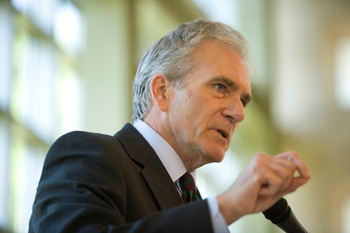By Ken Camp
When Baptists constituted a minority sect in America, bold spokesmen such as John Clarke, Obadiah Holmes and James Ireland took courageous stands for religious liberty, historians agree. Baptists like John Leland led in calling for separation of church and state and demanding liberty of conscience for all people.
But in communities where Baptists and other evangelicals predominate, do their spiritual descendants demonstrate the same commitment to speaking up for religious minorities?
When the shoe is on the other foot, are Baptists willing to stand up for nonbelievers or followers of non-Christian religions who object to religious displays on government property?
When they do, it can be a lonely place, said Brad Bull, whose opposition to a Ten Commandments display in Knox County, Tenn., set off a firestorm locally more than a dozen years ago. At the time, Bull served as associate pastor of youth and young adults at Cumberland Baptist Church in Knoxville.
Originally, he attended a public hearing regarding a resolution to authorize prominent placement of the Ten Commandments at the courthouse just to monitor the situation. Prior to the meeting, he privately expressed his concerns to a county commissioner, who later unexpectedly called on him to speak to the issue.
 “I was motivated by what I learned in seminary and from my reading of Baptist history,” he said. “Beyond that, it’s like I told a county commissioner at the time: ‘I have a neighbor who is Buddhist. Another neighbor is Muslim. They pay taxes in the county just like I do.’ I just saw what I did as an issue of fairness.”
“I was motivated by what I learned in seminary and from my reading of Baptist history,” he said. “Beyond that, it’s like I told a county commissioner at the time: ‘I have a neighbor who is Buddhist. Another neighbor is Muslim. They pay taxes in the county just like I do.’ I just saw what I did as an issue of fairness.”
He never anticipated the fallout. After the Knoxville newspaper and a local radio station reported his opposition to the resolution, his wife, Connie, nearly lost her job teaching Spanish and music as part of a cooperative for home-school students.
After the parents of a couple of her students objected to her husband’s comments, the church where she taught classes threatened to cease making its facility available. The cooperative placed her on leave for two weeks until the matter could be resolved.
After a three-hour meeting in which Bull fielded questions about his theology and his politics, all the parties involved finally agreed to disagree about the Ten Commandments display. A few days later, the Bulls joined several of the individuals involved in that meeting for dinner after a Christmas concert.
Looking back, Bull said, he not only felt he “went out on a limb” where many fellow Baptists failed to join him, but also believed some Baptists in the community were “shaking the tree.”
“I don’t have any regrets about the stand I took. My regret is for Baptists in general,” Bull said. “There’s a lot of lip service paid to separation of church and state and a lot of lip service offered to sacrifice, but there’s a whole lot of hypocrisy, myself included.”
Baptists need to honor their heritage by standing for religious liberty — and the principle of church-state separation that protects freedom of religion, said Courtney Krueger, pastor First Baptist Church in Pendleton, S.C.
“As a Baptist Christian, I believe that we Baptists have a heritage and therefore a responsibility of promoting the separation of church and state,” Krueger said. “We must remind ourselves and others that inappropriate entanglements between church and state tend to harm both.”
 In 2011, the Wisconsin-based Freedom from Religion Foundation responded to a complaint by an anonymous resident of Henderson County in East Texas, and they called on commissioners to remove a nativity scene from the courthouse lawn in Athens. The nativity was part of a display sponsored by Keep Athens Beautiful, and it also included secular holiday scenes.
In 2011, the Wisconsin-based Freedom from Religion Foundation responded to a complaint by an anonymous resident of Henderson County in East Texas, and they called on commissioners to remove a nativity scene from the courthouse lawn in Athens. The nativity was part of a display sponsored by Keep Athens Beautiful, and it also included secular holiday scenes.
Some East Texas Christians joined in a public rally supporting the nativity display, but Baptists among them voiced varied reasons for the support they offered.
Kyle Henderson, pastor of First Baptist Church in Athens, Texas, posted a statement on his church’s website framing the issue in terms of free speech, and he emphasized the need to stand in support of unpopular minority voices.
“Majority rule can be a terrible thing,” Henderson said. “That is why we have the Constitution and the legal system, to protect the rights of all people. We should not stand up because we have the majority and can intimidate others, but we should stand up because we believe every citizen has the right to freely express their opinion.
“We will need to defend our elected officials when they allow free speech to appear on the courthouse lawn, especially if it is a message with which we do not agree. … We will need to affirm the rights of all people, so we will not lose our rights to speak the truth.”
Too often, Baptists and other Christians respond reflexively and allow partisan political rhetoric to shape their responses to complex issues, rather than thinking critically about them, Krueger observed.
“I do wonder if a response would not be to ask that any using such rhetoric apply the Golden Rule to whatever situation or issue they are commenting on,” he suggested.
“If they would be willing to truly consider the ideas and situations of the ‘other,’ it might help them understand rather than simply attack another point of view.”
 Brent Walker, executive director of the Baptist Joint Committee for Religious Liberty, echoed the sentiment.
Brent Walker, executive director of the Baptist Joint Committee for Religious Liberty, echoed the sentiment.
“We need to understand there is ‘room for play in the joints,’ to quote the U.S. Supreme Court itself, between the two religion clauses in the first amendment. Not everything is either barred by the establishment clause or required by the free exercise clause. Both clauses need to be taken seriously, but not so rigorously that one swallows up the other,” Walker said.
“We need to worry as much about the liberty of others as our own — what a Christian thing to do — and acknowledge and embrace the religious pluralism that we have in this country,” he said.
